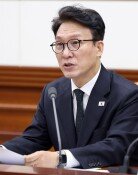Let us remind the Kim-Obuchi statement
Let us remind the Kim-Obuchi statement
Posted September. 27, 2013 06:38,
Miracles do not come miraculously.
This is the remark that former South Korean President Kim Dae-jung made at the Japanese Parliament on Oct. 8, 1998. The miracle is attributed to the blood and sweat of Korean people, he also said on the democratization of Korea. The former presidents speech, which was roundly applauded by members of the Japanese Parliament, will soon mark the 15th anniversary.
Speeches are not President Kims sole legacy. He had a historic dialogue with Japanese Prime Minister Keizo Obuchi on the day and produced a Korea-Japan partnership joint statement. The following is an excerpt from the statement.
By looking back on relations between Korea and Japan in this century, Prime Minister Obuchi humbly accepted the historic fact that Japanese colonial rule inflicted unbearable suffering and pain on the Korean people and expressed painfully deep repentance and heartfelt apology for the ordeal. President Kim Dae-jung sincerely acknowledged the Japanese prime minister`s perception of history, expressed appreciation and mentioned that it is a necessity of the times that both Korea and Japan make concerted efforts to overcome the unfortunate past and build a future-oriented relationship based on the spirit of reconciliation and friendship.
Prime Minister Obuchis apology is based on former Japanese Prime Minister Tomiichi Murayamas On the occasion of the 50th anniversary of the wars end. It has become a diplomatic document between the two countries leaders. It was unusual in that President Kim accepted it and expressed reconciliation. The joint statement included that Korea would accept Japanese culture.
It was meaningful that President Kim made the statement. Former President Park Chung-hee played a contrary role as he signed the Korea-Japan Basic Treaty of 1965 and started a relationship with Japan.
Korea put an end to the colonial rule under the 1965 Treaty but the treaty was far short of reconciliation between the two countries. Japan lacked self-reflection on the colonial rule and Koreans strongly protested against the treaty. It was Park Chung-hees military dictatorship that suppressed the protests and signed the treaty.
It was partly due to the strategic decision that Korea needs cooperation with Japan during the Cold War. It was not a wrong decision in that economic cooperation with Japan developed the Korean economy significantly but it had limits in that one party was a military dictatorship and the other party lacked regrets.
When President Kim Dae-jung, the symbol of Korean democratization, accepted Japanese prime ministers apology and mentioned reconciliation 33 years later, it occurred to me that the treaty signed by political enemies of the past got souls.
Fifteen years later, two countries have more cultural and people-to-people exchanges. But what are political leaders doing? Japanese Prime Minister Shinzo Abe and President Park Geun-hye have not met yet.
The problem lies on both sides. The Abe administration does not want to mention regrets on the past. It is understandable that it does not want to apologize indefinitely but Abe seems to think what former Prime Minister Nobusuke Kishi, his grandfather, gave to President Park Chung-hee. Abes historical view is closer to that of the past administration.
Meanwhile, some attempts are made to overhaul the treaty in Korea. The court has made a series of rulings that mandate Japan to compensate individual victim. The treaty says compensation is ultimately and completely made. It is because things have changed a lot but Japan seems puzzled. In addition, the Abe administrations attitude is straining the relationship between the two countries.
President Park seems to play hardball to Japan as if she tries to get out of the shadow of her father who was criticized for heavily leaning to Japan. If she does so because she cares about opposition parties and the people, I hope she could remember this: The giant progress in Korea-Japan relationship was not only made by her father but also by his arch rival.
In August, I attended a Korea-Japan forum in Seoul where the current crisis was discussed. Koreas Yu Myung-hwan and Japans Yuzaburo Mogi, co-chairmen of the forum, issued a joint statement and urged for a return to the spirit of Korea-Japan joint statement 15 years ago. Hopefully, the leaders of the both countries could show wisdom for the change of time based on the spirit of partnership.
(Written by Yoshibumi Wakamiya, senior fellow of Japan Center for International Exchange and former Asahi Shimbun columnist)







